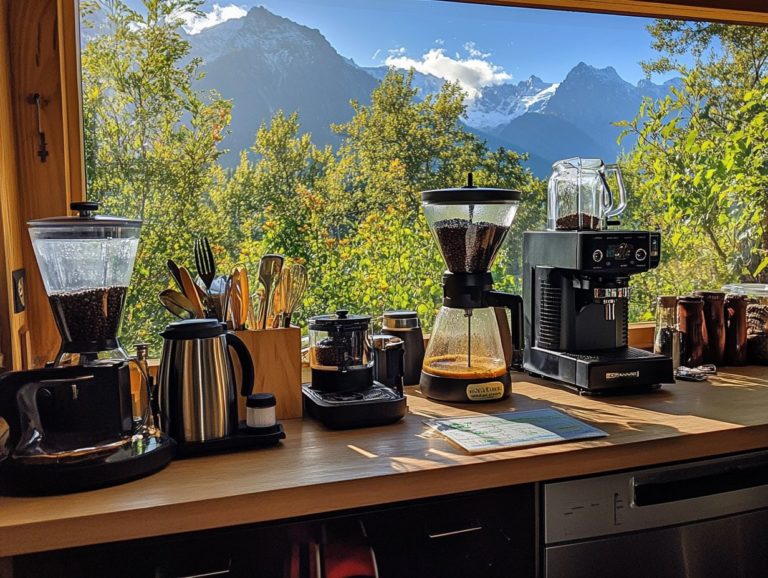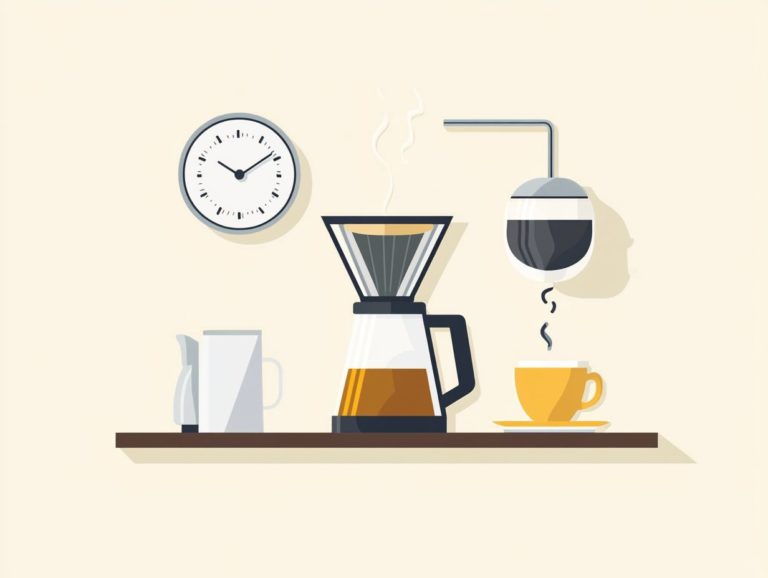Brewing Techniques for Sustainable Coffee
In a world where sustainability is becoming increasingly vital, you, as a coffee lover, find yourself on the lookout for sustainable options that not only satisfy your caffeine cravings but also contribute positively to the planet. This means picking coffee habits that are good for the planet!
This article invites you to explore what sustainable coffee truly entails, why it is very important, and the substantial environmental and social benefits it offers. You will delve into various brewing techniques, from the classic French press to the refreshing cold brew, while considering the key factors that influence your choice of method.
You will have the chance to debunk some common myths surrounding sustainable coffee, empowering you to make informed decisions. Embark on this journey with us to savor coffee that is as beneficial for you as it is for the earth!
Contents
- Key Takeaways:
- What Is Sustainable Coffee?
- Why Is Sustainable Coffee Important?
- What Are The Social Benefits Of Sustainable Coffee?
- What Are The Different Brewing Techniques For Sustainable Coffee?
- What Are The Factors To Consider When Choosing A Sustainable Coffee Brewing Technique?
- What Are Some Common Misconceptions About Sustainable Coffee?
- Frequently Asked Questions
- What are coffee subscriptions and how do they support sustainability?
- What is sustainable coffee?
- How do brewing techniques impact sustainability in coffee?
- What is shade-grown coffee and why is it important for sustainability?
- How can I ensure I am purchasing sustainably-sourced coffee?
- Are there any alternative brewing techniques for making sustainable coffee?
- What are some other ways to support sustainable coffee production?
Key Takeaways:
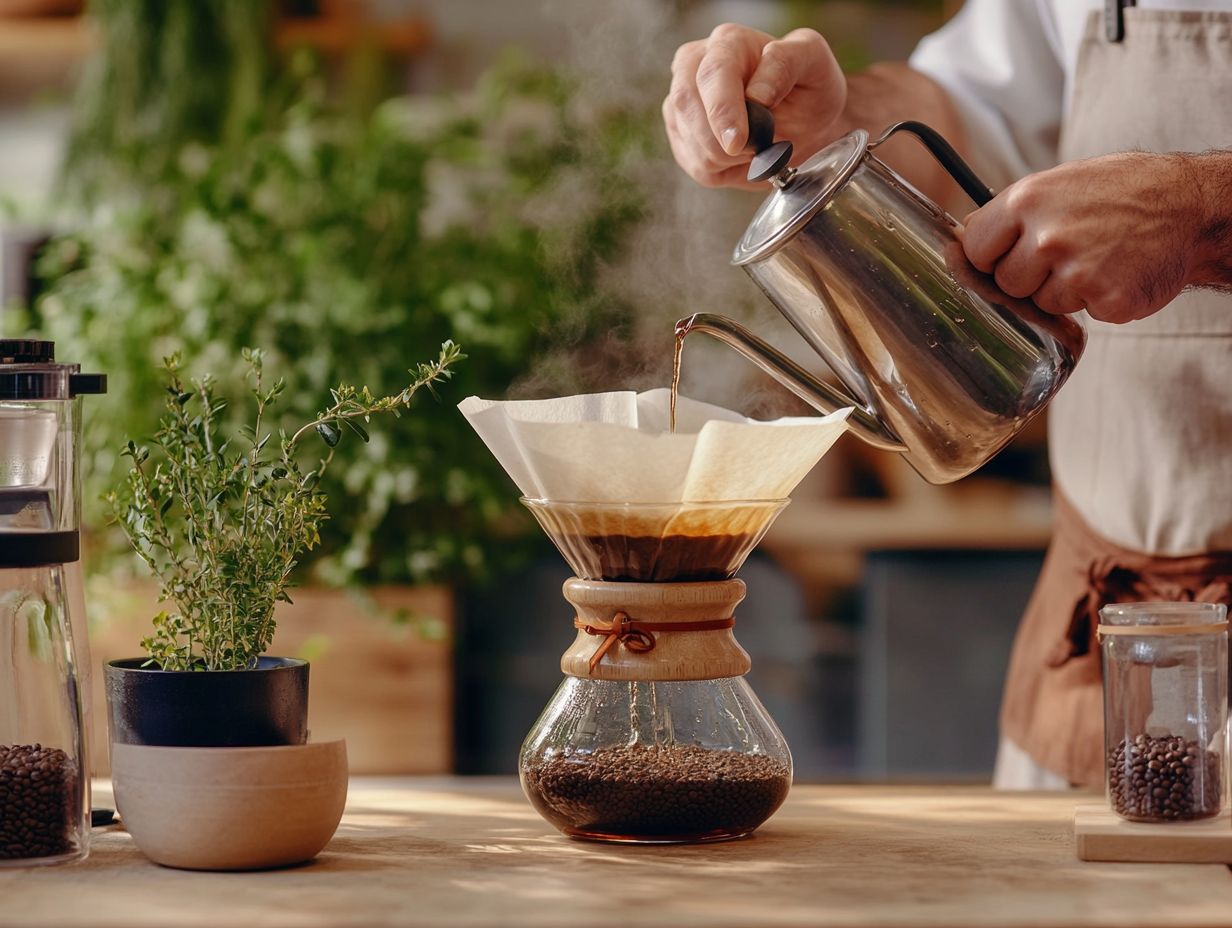
- Sustainable coffee offers both environmental and social benefits.
- There are multiple brewing techniques for sustainable coffee, including French Press, Pour Over, Cold Brew, Aeropress, and Moka Pot.
- When choosing a brewing technique, consider factors such as time, flavor preferences, cost, and environmental impact.
What Is Sustainable Coffee?
Sustainable coffee is all about coffee produced through environmentally responsible and socially equitable practices. It aims to minimize the environmental impact of coffee production while uplifting the local communities involved in its growing and selling. From the ethical beans used to the specialty coffee produced, every step is crucial for sustainability.
This approach embraces a variety of eco-friendly methods, such as sourcing ethical beans, reducing carbon footprints, and championing local roasters and coffee shops in their quest for sustainability within the coffee industry.
By choosing sustainable coffee, you ensure that both your love for a great cup of coffee and the health of our planet can thrive together. Opt for coffee subscriptions from responsible sources to support these efforts.
Why Is Sustainable Coffee Important?
Sustainable coffee is very important as it effectively tackles the considerable environmental challenges linked to traditional coffee farming, such as deforestation, water pollution, and excessive energy consumption. It also fosters waste reduction by promoting composting of coffee grounds and supports communities within coffee-producing regions.
By choosing sustainable practices, you can cultivate coffee consumption habits that are not only environmentally responsible but also socially beneficial. This approach ensures a brighter future for both coffee enthusiasts and the ecosystems that nurture this cherished beverage. Every cup of coffee, whether Arabica or Robusta, can make a difference.
What Are The Environmental Benefits Of Sustainable Coffee?
The environmental benefits of sustainable coffee are truly remarkable. By opting for sustainable practices, you reduce carbon footprints, implement effective waste reduction strategies, and improve soil health through methods like composting used coffee grounds. Composting is a way to recycle organic waste, turning it into nutrient-rich soil.
These advantages not only mitigate the adverse effects of traditional coffee farming but also promote biodiversity, which refers to the variety of plant and animal life in a particular habitat, conserve water, and encourage more responsible cultivation techniques that prioritize eco-friendly methods.
When you embrace sustainable coffee practices, you can drastically cut carbon emissions, contributing to global efforts against climate change. This approach often involves recycling waste products generated during the coffee production process, turning agricultural byproducts into valuable organic matter that enriches the soil. Additionally, using reusable filters and cups reduces reliance on disposable paper cups and filters, further lessening the environmental impact.
By fostering healthier ecosystems, you help preserve native plants and habitats essential for maintaining the balance of local wildlife. Ultimately, your commitment to sustainability enhances the quality of the coffee produced while supporting the environment’s well-being for future generations.
Join us in choosing sustainable coffee for a better tomorrow!
What Are The Social Benefits Of Sustainable Coffee?
The social benefits of sustainable coffee go well beyond your morning brew; they enhance community support, promote fair labor practices, and empower farmers through ethically sourced beans under Fair Trade and Direct Trade principles. These initiatives create economic stability in coffee-growing regions, ensuring that farmers receive fair compensation for their hard work.
Ultimately, this paves the way for a more equitable coffee industry. Leading brands like Starbucks and Green Mountain Coffee have adopted these principles to ensure responsible sourcing.
By embracing these sustainable practices, local farmers gain access to better markets and receive a premium for their high-quality coffee. This financial boost can lead to significant improvements in education and healthcare within their communities.
As farmers thrive, they can invest back into their communities, cultivating a self-sustaining ecosystem that benefits everyone involved. The support for ethical practices and responsible sourcing fuels the demand for sustainably sourced products, such as those certified by the Rainforest Alliance.
Consumers increasingly appreciate that their coffee supports these ethical practices, fueling a growing demand for sustainably sourced products. This rising awareness underscores the vital role of conscious consumption in crafting a future where everyone from the farmer to the consumer shares in the rewards.
Supporting coffee roasters who prioritize environmental sustainability and community support amplifies these benefits.
What Are The Different Brewing Techniques For Sustainable Coffee?
You can explore a variety of brewing techniques for sustainable coffee that elevate both flavor and eco-friendliness. Techniques like French press, pour over, cold brew, and Aeropress have garnered popularity among coffee aficionados.
Manual brewing methods such as these allow for greater precision and less energy consumption, aligning with sustainable practices. These methods not only offer a delightful spectrum of flavor notes but also emphasize sustainability by reducing energy consumption and waste.
By opting for reusable filters and equipment, you contribute to a more efficient brewing process that aligns with your commitment to the environment. This choice is crucial for reducing your coffee footprint associated with single-serve coffee pods and drip machines.
1. French Press
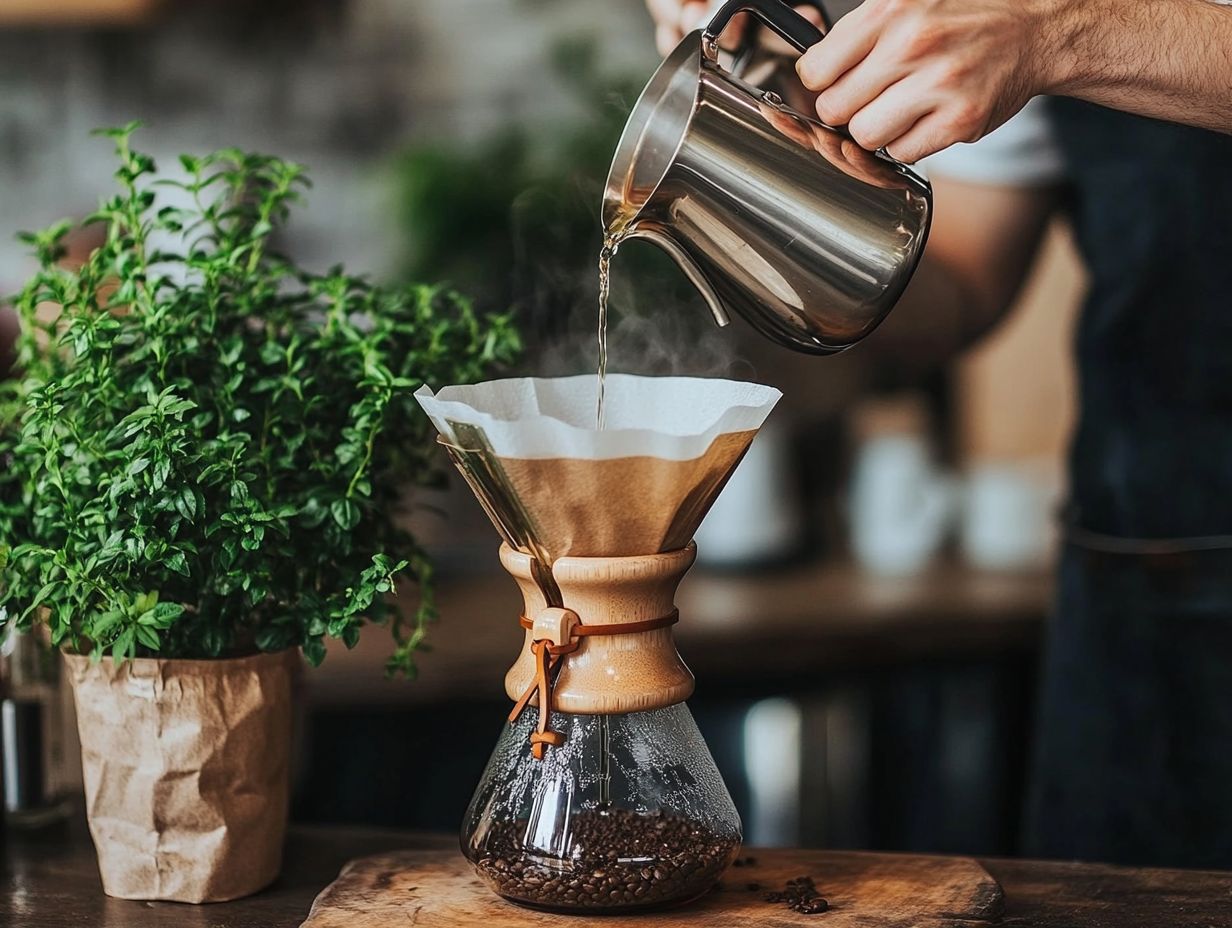
The French press stands as a timeless brewing method that embodies sustainable coffee practices, allowing you to extract rich flavors while utilizing reusable filters to minimize waste. This approach involves steeping coffee grounds in hot water, drawing out robust flavor notes and creating a full-bodied cup all without relying on disposable filters or contributing to plastic waste.
Brands like JavaPresse and U3 Coffee offer excellent options for those pursuing an eco-friendly coffee ritual. Engaging in this brewing technique fosters a deeper appreciation for the coffee’s origin and champions a zero-waste lifestyle, especially when you choose to compost your used grounds after brewing.
By reusing coffee grounds, you enrich your garden soil and enhance plant growth, illustrating how sustainable coffee consumption can contribute to a greener planet. This practice aligns with your commitment to reducing waste and promoting environmental sustainability.
If you’re looking to elevate your brewing experience, opting for organic, fair-trade coffee not only supports ethical sourcing but also aligns seamlessly with sustainability principles.
With the French press, every cup you brew can play a part in an environmentally friendly routine, cultivating greater awareness of the ecological impacts associated with coffee production. Consider coffee brands certified by Fair Trade and Direct Trade for your next purchase.
2. Pour Over
Pour-over is a meticulous brewing technique that empowers you to take charge of the extraction process and elevate the flavor notes of your coffee. This method has gained popularity among those who appreciate sustainable coffee practices. It promotes the use of reusable filters, encouraging you to savor every cup while focusing on quality rather than quantity. This method also significantly reduces the waste generated by single-use coffee containers and disposable filters.
With this straightforward yet effective pouring technique, you can explore a myriad of flavor profiles from the same beans. You can highlight distinct notes such as fruity, nutty, or chocolaty tones, all dependent on brewing time and water temperature. This approach enhances your coffee ritual and supports local coffee roasters dedicated to providing high-quality beans.
Pour-over requires minimal equipment, reducing waste compared to single-use coffee containers. This makes it an eco-friendly choice for conscientious consumers. As you pour water deliberately, you enhance the coffee’s aroma and taste while contributing to a more sustainable lifestyle. This brewing ritual can be both immensely satisfying and environmentally responsible. Try pairing this method with a reusable pod or filter to further minimize waste.
3. Cold Brew
Cold brew is an innovative brewing method that elevates your coffee ritual while reducing energy consumption compared to traditional brewing techniques. By steeping coffee grounds in cold water for an extended period, you enjoy a smooth, less acidic beverage and minimize the need for heating and disposable filters. This method is beneficial in reducing the carbon footprint associated with coffee brewing.
This approach to coffee preparation captivates coffee enthusiasts like you, offering an invigorating and delicious alternative to hot brews. With its rich, complex flavor profile that highlights the natural sweetness of the beans, the cold brew method appeals to those who value sustainable coffee practices. Try Cold Brew On Tap for a refreshing and convenient coffee experience!
By brewing with cold water, you conserve energy resources and promote the selection of ethically sourced beans, contributing to environmentally friendly coffee production. The rising trend of cold brew reflects a shift towards mindful consumption, where every cup you enjoy supports better practices within the coffee industry. Leading brands like Starbucks and Nespresso are adopting more sustainable practices to cater to this trend.
4. Aeropress
The Aeropress is your go-to brewing method that embodies sustainable coffee practices. You can create a concentrated coffee using reusable pods, significantly reducing waste from coffee grounds. This innovative device is easy to use and clean, making it a top choice for eco-conscious coffee lovers who value both sustainability and flavor. Incorporating composting into your coffee habits enhances waste reduction.
Its compact design is perfect for travel and outdoor adventures, allowing you to enjoy a rich, delicious brew without the hassle of disposable filters or bulky equipment. Whether you love the moka pot or prefer other manual brewing methods, its portability is unmatched. This brewing technique seamlessly integrates eco-friendly habits into your daily routine, minimizing your environmental footprint. It’s a wonderful way to combine a love for java with responsible coffee consumption.
The Aeropress invites you to explore various grind sizes and brewing times, granting you the freedom to experiment and discover your unique flavor profile. It’s perfect for those eager to hone their coffee brewing skills.
What Are The Factors To Consider When Choosing A Sustainable Coffee Brewing Technique?
Understanding how your coffee choices impact the environment and your lifestyle can help you make more informed decisions.
When selecting a sustainable coffee brewing technique, it’s crucial to consider various factors, including time and convenience, flavor preferences, equipment costs, and how your choice affects the environment. To enhance your experience, explore brewing techniques to elevate your coffee experience. The choice can affect everything from your carbon and coffee footprint to the flavor notes of your final brew.
Each brewing technique presents its unique advantages and trade-offs. This allows you to align your coffee rituals seamlessly with sustainable practices.
1. Time And Convenience
Time and convenience are paramount when selecting a sustainable coffee brewing technique, especially in your fast-paced lifestyle. Whether you re opting for single-serve options or other quick methods, it s important to ensure they align with your coffee habits and sustainability goals.
You ll love how methods that require minimal preparation can effortlessly fit your lifestyle! Methods requiring minimal cleanup might better suit your needs. Single-serve options, particularly those using reusable pods, offer quick convenience without compromising sustainability.
You can streamline the process further by using methods like pour-over brewing, incorporating pre-measured coffee grounds, or utilizing an automatic drip coffee maker. Reusable filters in these methods significantly reduce paper cup and plastic waste. These approaches not only lessen cleanup efforts but also provide a customizable coffee experience that caters to your individual tastes.
Innovative gadgets, such as electric French presses, are increasingly popular, merging efficiency with a rich flavor profile in no time. By choosing eco-friendly filters or biodegradable options, you enhance sustainability, ensuring your quick coffee fix is gentle on the planet while fitting into your busy schedule.
2. Flavor Preferences
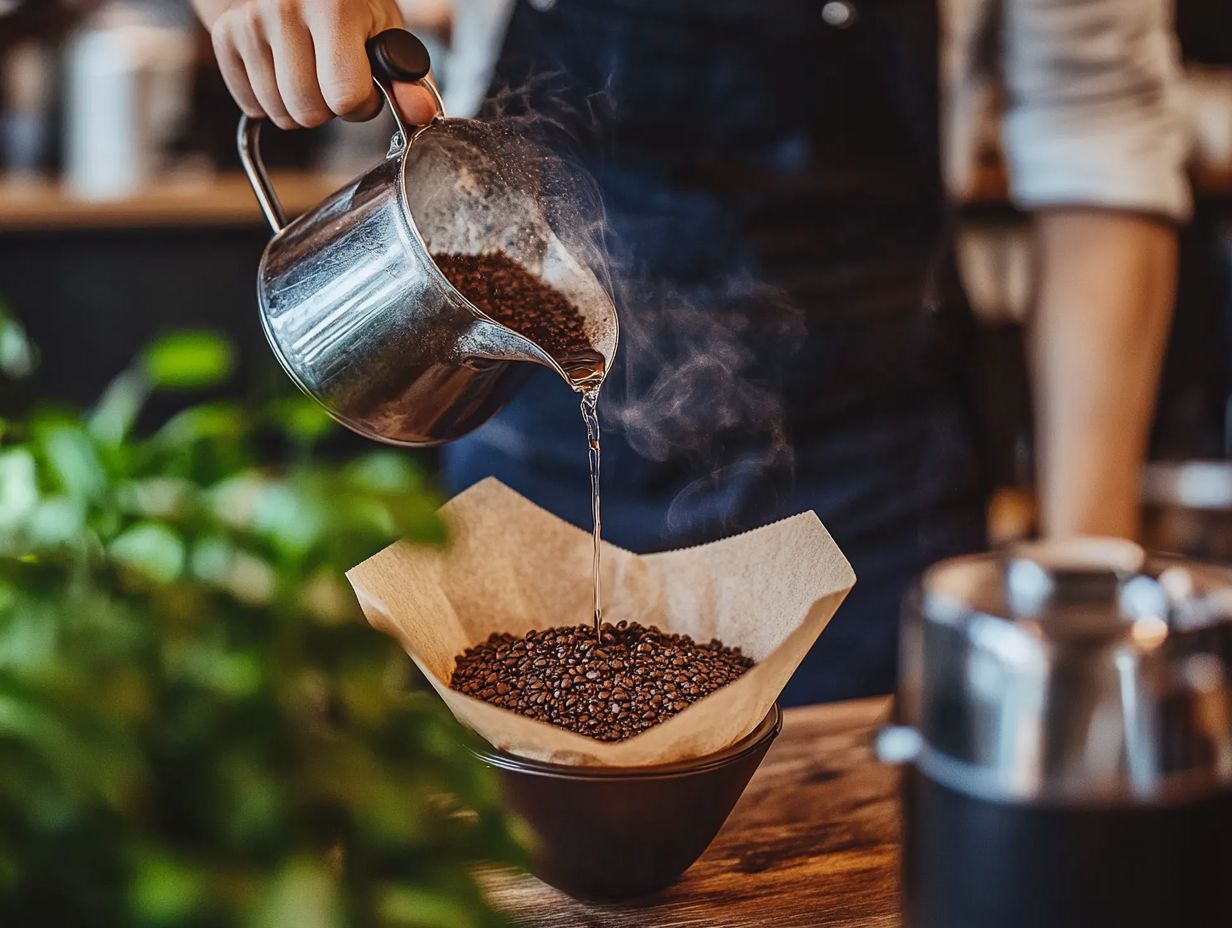
Flavor preferences play a significant role in shaping your coffee experience. Consider how different brewing techniques impact the final taste of your coffee.
Flavor preferences are vital when selecting a sustainable coffee brewing technique, as each method offers its unique flavor profile and experience. For instance, you may find yourself drawn to the bold richness of a French press, while someone else might cherish the crystalline clarity provided by pour-over brewing.
Your chosen brewing method can dramatically transform the sensory experience of each cup. If you delight in fruity or floral notes, a pour-over technique will accentuate these delicate nuances, allowing you to appreciate the subtle complexities of meticulously sourced beans fully.
If you re an espresso enthusiast, the concentrated richness produced by pressure brewing amplifies the sweetness and body of your coffee, offering a satisfying experience. Brands like Nespresso have made this method accessible at home.
For those seeking a smoother, less acidic option, cold brew is perfect especially for sweltering summer days. Options like Cold Brew On Tap can make preparation even easier. By thoughtfully aligning your brewing methods with your specific flavor preferences, you can craft personalized and unforgettable coffee moments.
Experiment with different brewing techniques to discover which one resonates with you the most! Share your experiences and favorite methods with fellow coffee lovers.
3. Cost
Cost plays an important role in selecting a sustainable coffee brewing technique, as some methods demand a heftier upfront investment in equipment than others. Whether you re investing in a high-quality espresso machine or a simple French press, the initial investment can impact your decision.
However, considering the long-term benefits of energy efficiency and waste reduction can positively influence your choice. Take, for instance, the allure of a high-quality espresso machine from brands like K-Cup or Green Mountain Coffee. While it may appear pricey at first, its long-lasting nature and ability to produce caf -quality beverages at home can significantly lessen your ongoing expenditures on caf visits.
Conversely, simpler methods like a French press or pour-over setup often require a lower initial investment and minimal maintenance costs, making them incredibly accessible while also championing eco-friendly practices.
Incorporating reusable filters or opting for green coffee can further amplify the value of your choice. Brands focused on sustainable coffee often offer excellent coffee subscriptions that enhance both convenience and sustainability. It s crucial to balance these financial considerations with your personal preferences, allowing you to select a brewing method that aligns with both your budget and your environmental sustainability goals.
4. Environmental Impact
The environmental impact of your coffee habits is crucial in sustainable coffee consumption. Understanding your choices can help minimize the negative effects on the planet. The impact of your chosen brewing techniques is a vital consideration in sustainable coffee consumption.
When you select methods that prioritize waste reduction, energy efficiency, and responsible sourcing of materials, you actively contribute to lowering your overall coffee footprint. By opting for reusable filters and equipment, you can significantly diminish the ecological footprint associated with brewing your favorite beverage.
For instance, using a French press or pour-over method not only enhances the flavor profile of your brew but also minimizes your reliance on single-use plastics and paper products that ultimately end up in landfills. This approach is perfect for those who are passionate about waste reduction. Energy-efficient brewing appliances, especially those equipped with programmable settings or auto shut-off features, can further cut down on your electricity consumption.
By embracing these sustainable practices, you not only indulge in a rich and satisfying cup of coffee but also play a part in fostering a healthier planet. Composting coffee grounds not only reduces waste but also creates nutrient-rich compost, making it a win-win for both you and the planet!
What Are Some Common Misconceptions About Sustainable Coffee?
Misconceptions can hinder the adoption of sustainable coffee habits. It’s important to dispel these myths to better understand its benefits.
You might encounter several prevalent misconceptions about sustainable coffee that can cloud your understanding of its cost, flavor quality, and perceived exclusivity to niche coffee rituals. These myths can easily dissuade you from exploring the rich and rewarding world of sustainable coffee, which is not only affordable but also boasts a remarkable array of diverse flavor profiles waiting to be discovered.
Start making these changes today to enjoy great coffee while helping the environment!
1. Sustainable Coffee Is More Expensive
Cost Per Cup
One common misconception is that sustainable coffee is pricier than conventional options, largely due to the belief that ethical beans and environmentally friendly practices drive up costs. The truth is, many sustainable coffee options are competitively priced, and the long-term benefits of supporting ethical practices often outweigh any initial expenses.
Value Beyond Price
If you re mindful of your budget, rest assured that there are plenty of affordable brands that prioritize sustainability without charging a premium. Companies like Equal Exchange and Peace Coffee provide a variety of reasonably priced options that not only taste fantastic but also ensure fair wages for farmers and promote environmental stewardship.
By choosing these brands, you can enjoy high-quality brews while contributing positively to the environment and supporting fair trade practices. Many of these brands also participate in direct trade (a practice where buyers purchase directly from the producers), ensuring even more ethical practices. Ultimately, the value of making ethical choices translates into a more meaningful coffee experience, knowing that every cup you sip contributes to a better world.
2. Sustainable Coffee Doesn’t Taste As Good
The quality of sustainable coffee often surpasses expectations, offering a variety of flavor profiles. You may be surprised to find that sustainable coffee offers rich, complex flavors that rival traditional varieties.
Many sustainable options come from high-quality coffee producers that boast rich, complex flavors. Take brands like Stumptown and Blue Bottle, for example. They have positioned themselves as trailblazers in the sustainable coffee movement, presenting blends that are not only ethically sourced but also incredibly flavorful.
Consider single-origin coffees from regions like Ethiopia and Colombia they often burst with vibrant notes of berry and chocolate that truly captivate the palate. Local roasters frequently offer these exceptional options, and the meticulous attention to detail in sustainable farming tends to enhance the quality of the beans, delivering a sensory experience that delights even the most discerning coffee aficionados.
By exploring these high-quality offerings, you’ll discover that sustainability and exceptional taste can beautifully coexist.
3. Sustainable Coffee Is Only For Hipsters
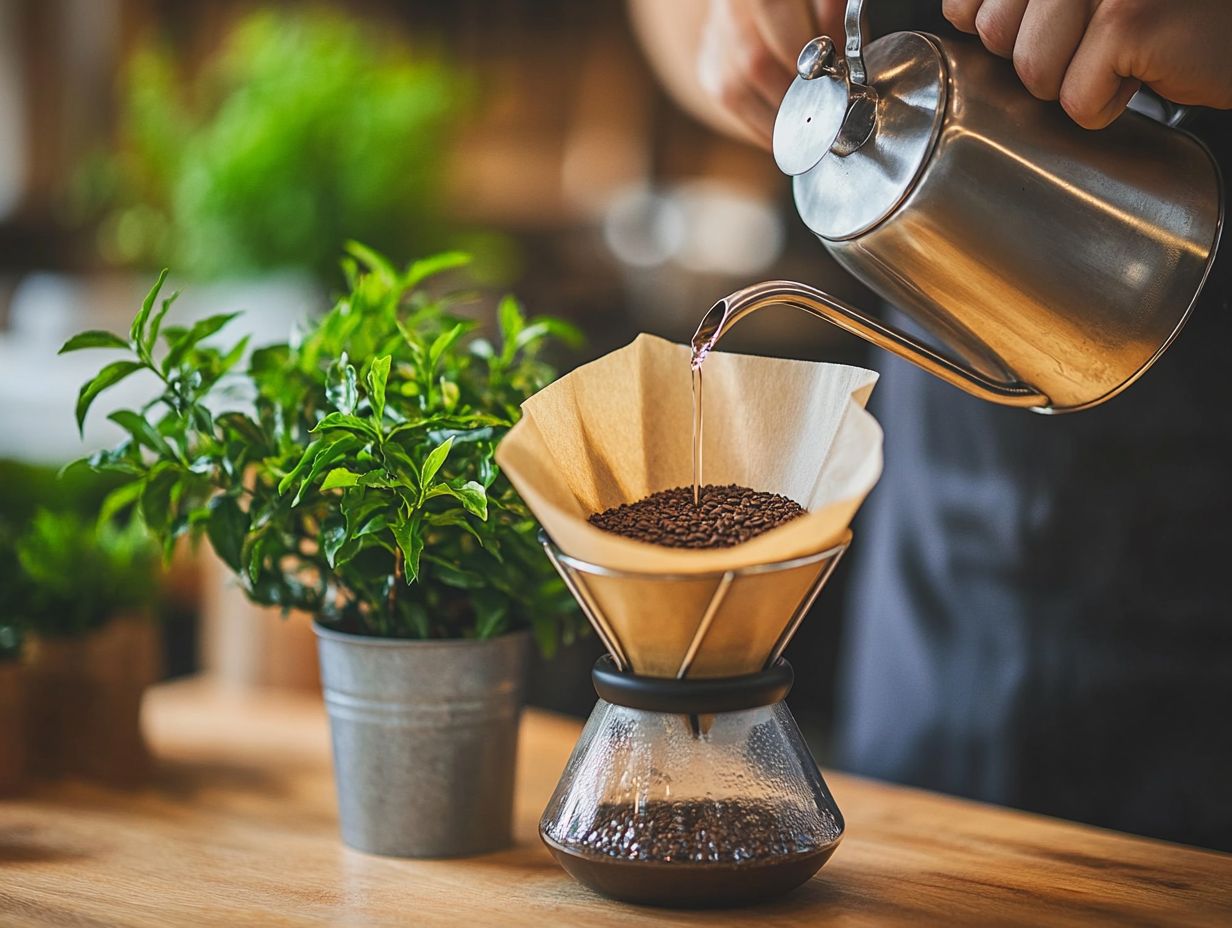
The idea that sustainable coffee is solely for hipsters is a misconception that overlooks the growing mainstream embrace of eco-friendly coffee practices and community support initiatives. Coffee shops worldwide are adopting these methods, making sustainable coffee accessible to everyone.
In truth, sustainable coffee appeals to a diverse audience, transcending niche markets and inviting all coffee lovers to partake in environmentally responsible rituals. From casual drinkers to dedicated aficionados, individuals from all walks of life are discovering the positive impact their coffee habits can have.
The vibrant movement towards ethical sourcing supports farmers and promotes biodiversity while resonating with those who prioritize health and quality in their cup of coffee.
As awareness spreads, savoring a cup of sustainably sourced coffee becomes a small yet meaningful step toward a greener future and waste reduction, fostering a shared commitment to the planet. This shift emphasizes our collective responsibility to nurture the environment while enjoying the rich flavors that sustainability and ethical beans offer.
Frequently Asked Questions
What are coffee subscriptions and how do they support sustainability?
Coffee subscriptions provide a regular delivery of coffee, often from specialty coffee roasters. They help reduce plastic waste and paper cups by encouraging home brewing. This also supports local roasters and sustainable practices.
What is sustainable coffee?
Sustainable coffee, often called responsibly sourced or ethical beans, is produced using farming techniques that prioritize environmental conservation and social responsibility. It also ensures economic viability for farmers.
Brands like Green Mountain Coffee and U3 Coffee are known for their commitments to these sustainable practices.
How do brewing techniques impact sustainability in coffee?
Brewing techniques can greatly impact coffee sustainability. For example, using a French press, AeroPress, or pour-over method can reduce waste compared to single-use coffee pods.
These manual brewing methods also reduce energy consumption associated with electric drip machines.
What is shade-grown coffee and why is it important for sustainability?
Shade-grown coffee is grown under a canopy of trees, mimicking the natural environment for coffee plants. This practice helps preserve biodiversity and prevents deforestation, making it vital for sustainable coffee production.
Shade-grown coffee also conserves carbon footprint by reducing the need for synthetic fertilizers, which are significant contributors to agricultural emissions.
How can I ensure I am purchasing sustainably-sourced coffee?
When buying coffee, look for exciting certifications like Rainforest Alliance, Fair Trade, Direct Trade, or Organic! These certifications guarantee that the coffee has been produced using sustainable and ethical practices.
Also, purchase from local roasters that emphasize responsible sourcing.
Are there any alternative brewing techniques for making sustainable coffee?
Yes, there are several alternative brewing techniques for sustainable coffee. You can use a French press, pour-over, moka pot, or cold brew method. These methods typically produce less waste and require less energy than traditional drip coffee machines.
Act now by investing in reusable filters and reusable cups to make a significant impact on waste reduction!
What are some other ways to support sustainable coffee production?
In addition to choosing sustainably sourced coffee, you can support sustainable coffee production by buying from local and small-scale farmers. Avoid over-roasted or flavored coffees, and properly dispose of coffee grounds and filters.
Setting up a compost program for used coffee grounds can contribute to environmental sustainability and create nitrogen-rich compost.


